
Top Enterprise Strategy Agency to Work With - October 2025
Introduction
Enterprise strategy has evolved rapidly over the past year, driven by economic uncertainty, AI disruption, and shifting customer expectations. As businesses rethink scale and transformation, selecting the right Enterprise Strategy Agency in October 2025 has become more critical than ever for long-term success.
While many companies are expanding internal strategy teams, hiring an Enterprise Strategy Agency remains essential due to their specialized expertise, ability to solve bandwidth constraints, and cost efficiency at scale. In the following guide, we uncover the top 10 Enterprise Strategy Agency partners leading global innovation and growth today.
Top 10 Enterprise Strategy Agency
1. G & Co.
G & Co. is a leading enterprise consulting group and enterprise strategy firm helping global companies design, develop, and deploy next-generation enterprise digital strategy initiatives that drive business transformation.
Recognized for its ability to merge design thinking with enterprise technology consulting, G & Co. works with Fortune 500 companies and high-growth disruptors to create scalable, future-ready solutions across operations, brand, and digital ecosystems. Their enterprise consulting services include business model reinvention, CX transformation, platform integration, and go-to-market planning. Known for their work with global brands across retail, finance, and healthcare, G & Co. empowers clients to align technology with business objectives through integrated enterprise consulting and strategic execution.
G & Co. is a minority business enterprise (MBE), as certified by the National Minority Supplier Development Council (NMSDC). If diversity inclusion is a part of your supplier process, contact us—we may be a great fit for your enterprise.What Is Enterprise Strategy?

2. BCG Platinion
BCG Platinion is the enterprise technology consulting and enterprise strategy arm of Boston Consulting Group that bridges strategy with implementation for global businesses undergoing digital transformation.
Combining engineering depth with strategic foresight, BCG Platinion delivers enterprise consulting services that include enterprise architecture planning, IT modernization, cybersecurity, and advanced analytics integration. Their enterprise digital strategy work supports multinational corporations in streamlining operations and accelerating innovation. Known for engagements with companies across financial services, healthcare, and industrial sectors, BCG Platinion offers enterprise integration services that turn complex legacy systems into agile digital environments.
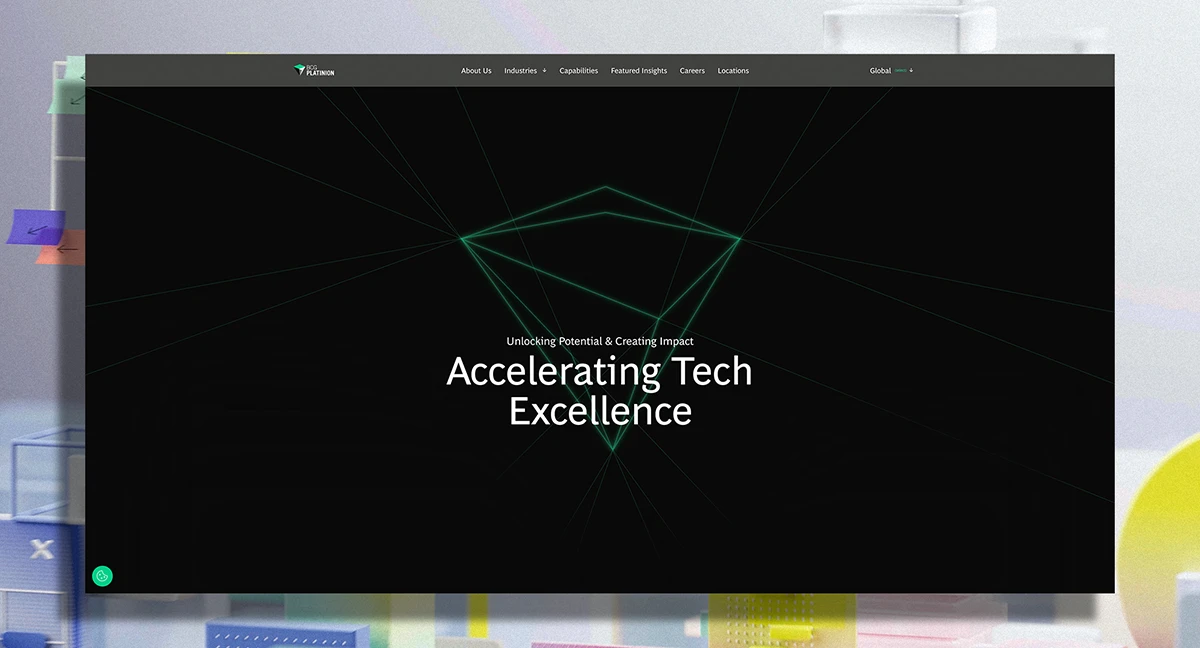
3. West Monroe
West Monroe is an enterprise consulting group that blends business strategy with digital engineering to deliver end-to-end enterprise consulting services for companies seeking long-term transformation.
As a firm known for operational excellence and enterprise digital strategy, West Monroe supports clients in navigating M&A integrations, enterprise system modernization, and digital product development. Their cross-disciplinary teams work across industries including energy, financial services, healthcare, and consumer products, offering enterprise strategy solutions rooted in both technology and change management. With capabilities spanning enterprise content management consulting and IT advisory, West Monroe helps clients build the digital backbone of the future.
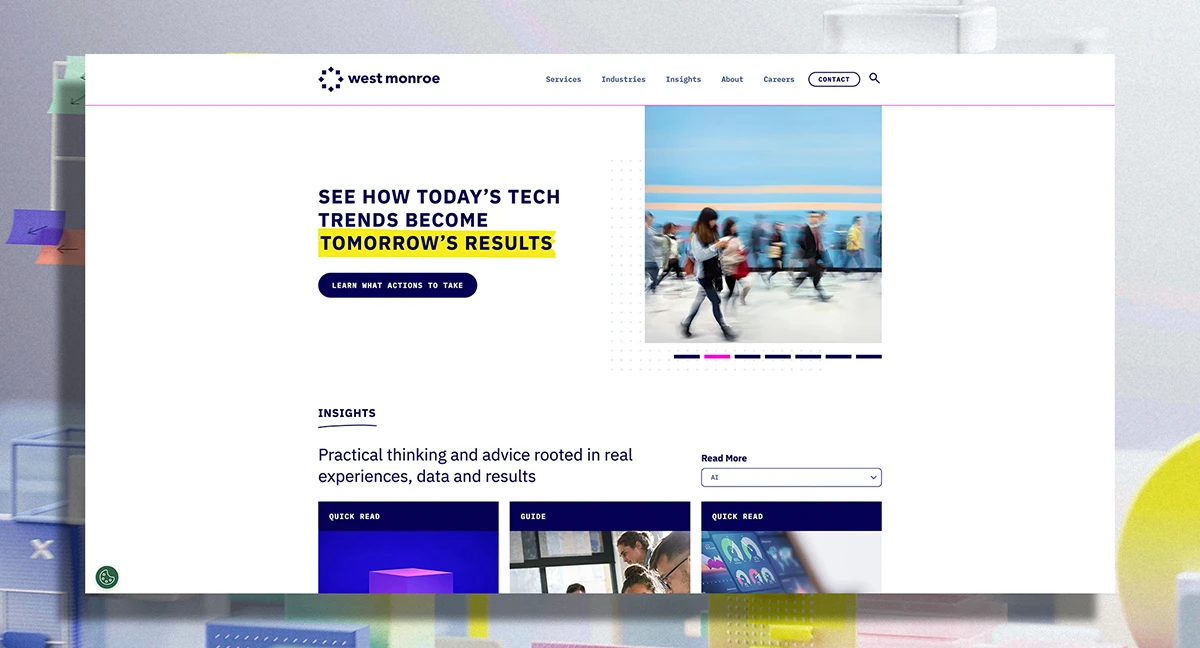
4. Slalom
Slalom is an enterprise consulting firm and enterprise strategy partner focused on helping businesses reimagine their digital potential through cloud transformation, data strategy, and customer experience design.
Slalom’s enterprise consulting services are built around deep collaboration with clients and partnerships with platforms like Salesforce, AWS, and Google Cloud. Their expertise in enterprise integration services helps organizations unify data, automate workflows, and improve time-to-insight across business units. Slalom serves clients in retail, life sciences, public sector, and more, and is widely respected for its people-first approach and ability to implement strategic enterprise digital strategies with speed and agility.

5. Toptal Business
Toptal Business is an elite enterprise consulting group that connects global companies with top-tier strategic consultants and enterprise technology experts to address complex business challenges with precision.
Their enterprise consulting services cover areas like corporate strategy, process optimization, enterprise content management consulting, and operational scaling. Leveraging a curated network of freelance experts, Toptal delivers enterprise strategy engagements that are flexible, fast, and customized to the client's needs. Known for working with firms ranging from startups to Fortune 1000, Toptal Business enables companies to access world-class enterprise strategy insights without traditional consulting overhead.
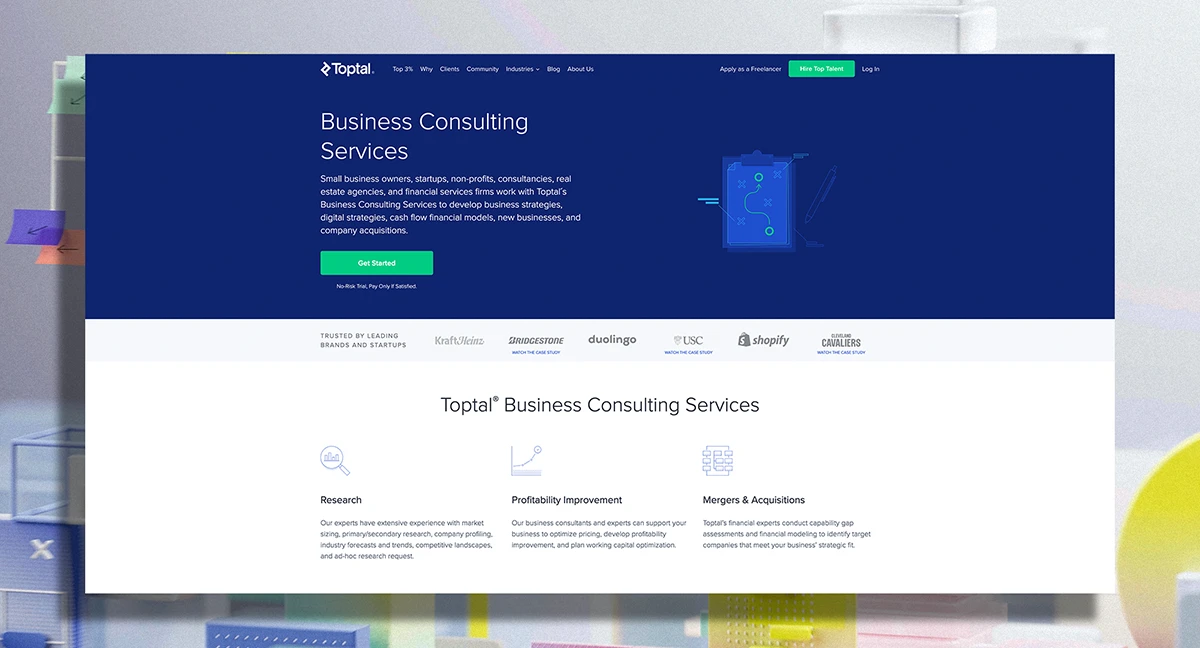
6. PA Consulting
PA Consulting is an enterprise strategy firm that blends innovation with enterprise consulting services to help companies deliver growth, reduce risk, and harness emerging technologies.
PA is recognized for its hands-on approach to enterprise digital strategy and its deep sector experience in defense, healthcare, energy, and financial services. Their enterprise technology consulting offerings span digital twins, IT transformation, and agile operations, while their enterprise integration services help clients break down data silos and unlock business value. PA Consulting is known for its practical yet visionary approach, supporting long-term enterprise evolution through innovative thinking and detailed implementation.

7. ThoughtWorks
ThoughtWorks is a global enterprise consulting group and enterprise strategy leader focused on delivering technology-driven transformation for complex, digital-first organizations.
With strong roots in agile development and software engineering, ThoughtWorks delivers enterprise consulting services including digital platform design, legacy system replacement, and enterprise content management consulting. Their enterprise digital strategy capabilities are bolstered by their work with leading telecom, financial services, and logistics firms. Known for thought leadership in digital transformation and continuous delivery, ThoughtWorks combines innovation with discipline to drive measurable enterprise impact.
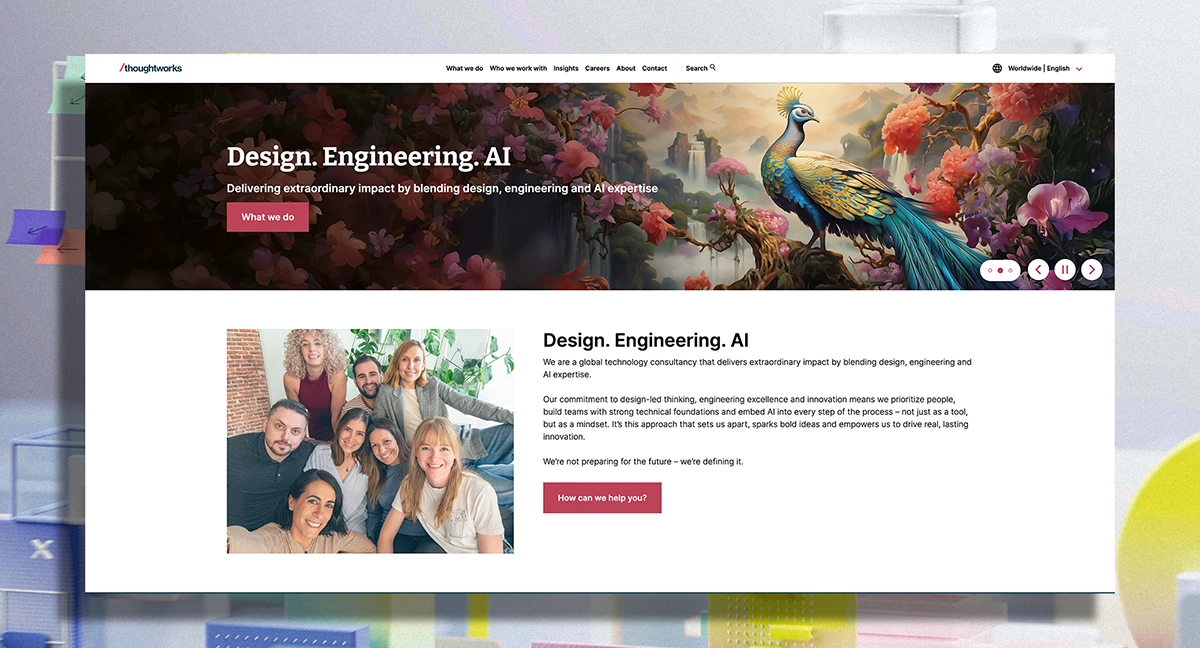
8. Wavestone
Wavestone is a global enterprise strategy and enterprise consulting firm that partners with executive leadership to design and implement future-ready enterprise operating models and technology transformations.
Their enterprise consulting services focus on strategic IT planning, cybersecurity, digital transformation, and enterprise integration services. Wavestone has worked with global brands across transportation, energy, and manufacturing, delivering enterprise digital strategy solutions that ensure alignment between IT capabilities and business goals. As an enterprise consulting group, Wavestone is known for its structured methodology, stakeholder collaboration, and post-implementation support.
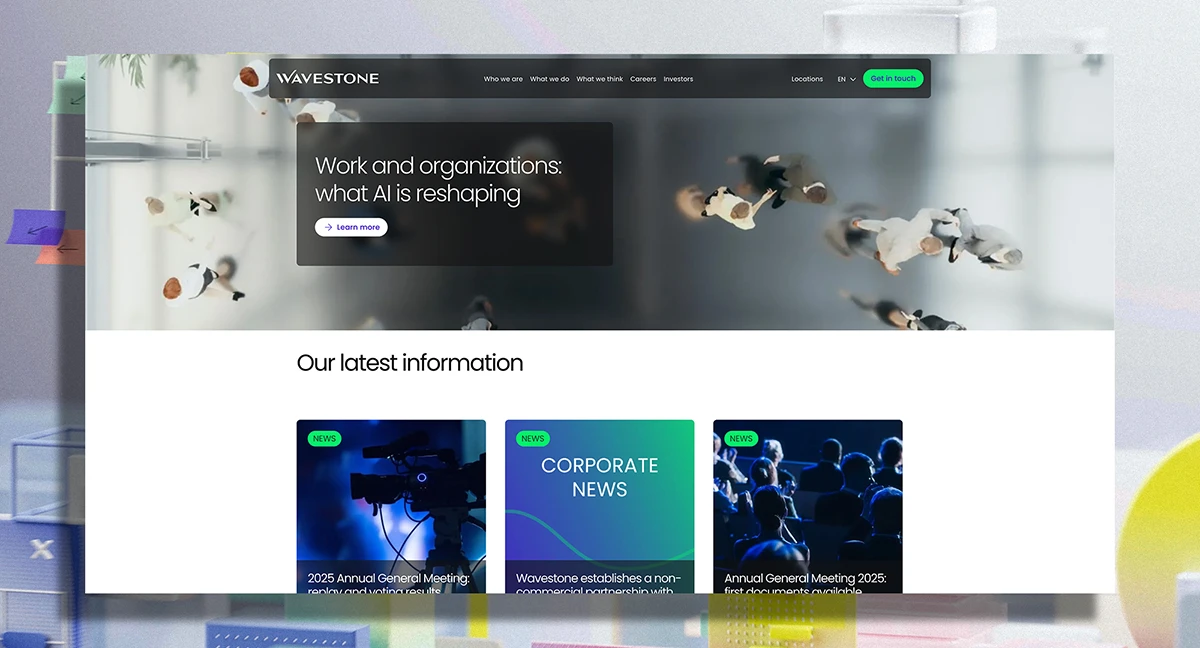
9. North Highland
North Highland is an enterprise consulting firm and enterprise strategy agency known for delivering people-centric digital and operational transformation through advisory, implementation, and managed services.
They provide enterprise consulting services across business transformation, workforce enablement, and data integration to companies in healthcare, public sector, and retail. Their enterprise technology consulting practice supports clients with IT operating model development, vendor selection, and digital roadmap execution. North Highland's human-centered approach and commitment to co-creation help enterprises drive sustainable change with enterprise digital strategy at the core.
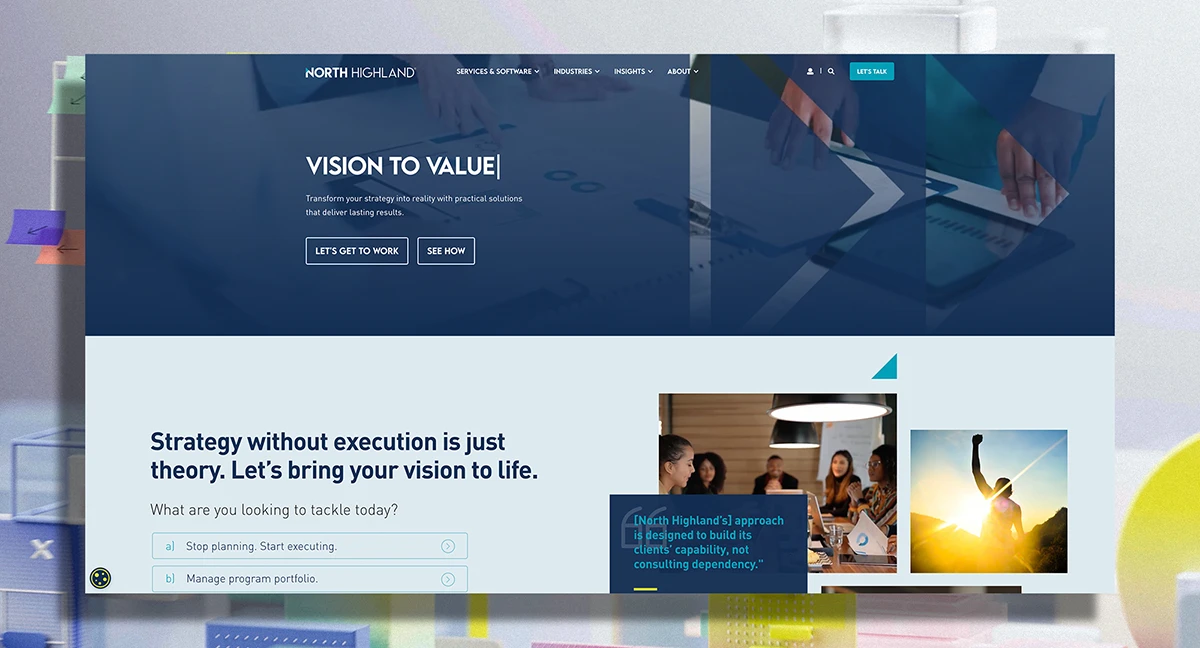
10. Sia Partners
Sia Partners is a global enterprise consulting group and enterprise strategy firm that helps clients across sectors navigate disruption with data-driven strategies and digital innovation.
They offer enterprise consulting services including process reengineering, digital maturity assessments, enterprise content management consulting, and AI-powered transformation. Their client roster includes energy majors, financial institutions, and transportation authorities, and they are known for blending traditional enterprise strategy with advanced technology solutions. Sia Partners' expertise in enterprise integration services enables clients to future-proof their systems and operate more efficiently in dynamic markets.

How Does Enterprise Strategy Work?
Enterprise strategy refers to the overarching, long-term plan that defines a company’s direction, objectives, and approach to value creation across all business units, geographies, and functions. It integrates corporate vision with operational execution by aligning resources, capabilities, and market positioning to achieve sustainable competitive advantage. Unlike business-level or functional strategies, enterprise strategy addresses macro-level priorities such as portfolio optimization, digital transformation, global expansion, ESG commitments, and strategic risk management. Its purpose is to ensure cohesion and adaptability across the organization in response to evolving market dynamics, regulatory shifts, and technological disruption.
What Is an Enterprise Strategy Agency?
Enterprise Strategy Agency operates by assessing internal capabilities, external market forces, and long-term goals to define a clear roadmap for growth, innovation, and operational excellence. The process begins with rigorous diagnostics—evaluating the company’s current state across financial performance, organizational structure, technology infrastructure, and market competitiveness. From there, strategic objectives are set, typically over a 3–5 year horizon, accompanied by prioritized initiatives that drive cross-functional alignment. Execution relies on strong governance models, agile operating structures, and KPI frameworks that translate strategic intent into measurable outcomes. Success is driven by continuous reassessment and recalibration as conditions change.
Enterprise challenges in 2025 demand more than siloed solutions—they require holistic, forward-thinking strategies that align vision, operations, and technology at scale. This is where the capabilities of an Enterprise Strategy Agency become critical, offering the expertise and structured approach needed to address the complexity of modern business environments.
In this section, explore the core capabilities that define a world-class Enterprise Strategy Agency—from enterprise consulting and digital strategy to integration services and technology transformation. These capabilities illustrate how the right agency partner can drive growth, resilience, and long-term value across the full scope of enterprise operations.
What Services Do Enterprise Strategy Agency Provide?
An enterprise strategy agency is a specialized consulting partner that collaborates with large organizations to design, refine, and implement enterprise-wide strategic initiatives. These agencies bring a blend of analytical rigor, cross-industry insights, and deep functional expertise to support corporate decision-makers in navigating complex challenges such as digital transformation, M&A integration, globalization, and organizational redesign. Through structured frameworks and data-driven methodologies, an enterprise strategy agency helps align executive vision with operational reality, ensuring cohesive strategy execution across all business units. Their value lies in enabling scalability, accelerating innovation, and de-risking strategic investments through objective, high-impact advisory support.
Enterprise Strategy Development
An Enterprise Strategy Agency provides clients with enterprise strategy development services that shape long-term direction and competitive positioning. This includes defining corporate mission, vision, and objectives, while aligning strategic priorities across business units, functions, and geographies. Leveraging market intelligence, internal diagnostics, and financial modeling, the agency formulates a data-backed roadmap that guides leadership through transformation, portfolio management, and growth initiatives. The goal is to enable scalable decision-making frameworks and ensure strategic coherence across the organization.
Enterprise Digital Strategy
Enterprise digital strategy services center on integrating digital capabilities into the core of enterprise operations. A strategy agency assesses the digital maturity of the organization and identifies opportunities for innovation, automation, and customer experience enhancement. This includes building a comprehensive digital roadmap that aligns with business goals, whether through omnichannel enablement, data-driven personalization, or technology platform modernization. The agency ensures digital strategy is actionable, measurable, and fully embedded into enterprise-wide processes and governance.
Business Model Transformation
Through business model transformation services, an Enterprise Strategy Agency helps companies evolve or reinvent how value is created, delivered, and captured. This involves redefining revenue streams, operating models, cost structures, and value propositions in response to shifting industry landscapes or disruptive threats. Using scenario planning, customer segmentation, and ecosystem analysis, the agency enables clients to identify scalable innovation paths and operational levers that unlock new market opportunities and ensure long-term viability.
Enterprise Integration Services
Enterprise integration services focus on aligning disparate systems, functions, and processes across the organization to operate as a cohesive whole. This includes post-merger integration, functional synergy optimization, and IT system unification. An Enterprise Strategy Agency leads clients through planning, change management, and performance tracking to ensure seamless execution. Integration efforts are backed by enterprise architecture frameworks that ensure scalability, data consistency, and regulatory compliance across regions and platforms.
Organizational Design and Change Management
Organizational design and change management services help companies restructure their workforce, leadership, and governance models to support strategic goals. An Enterprise Strategy Agency evaluates current organizational inefficiencies, talent gaps, and cultural dynamics to design future-ready structures. From C-suite realignment to agile team deployments, the agency facilitates transformation through targeted change management programs that ensure adoption, reduce resistance, and embed new behaviors across all levels of the organization.
Enterprise Technology Consulting
Enterprise technology consulting involves advising on the selection, implementation, and scaling of technology platforms that support enterprise goals. This includes ERP modernization, cloud migration, AI deployment, and cybersecurity architecture. A strategy agency bridges business strategy with IT execution, ensuring that technology investments deliver ROI and support business agility. Services also include vendor evaluation, implementation roadmaps, and alignment with enterprise digital strategy to drive sustained performance.
Performance Management and KPI Alignment
Performance management and KPI alignment services ensure that enterprise strategy translates into measurable outcomes. A strategy agency helps clients define success metrics, build dashboarding tools, and establish data governance to monitor progress against strategic goals. These services provide the foundation for evidence-based decision-making and strategic accountability, enabling leadership to course-correct in real time and optimize performance across divisions, regions, and business units.
Enterprise Content Management Consulting
Enterprise content management consulting helps organizations structure, store, and govern information assets to improve accessibility, compliance, and collaboration. A strategy agency audits existing systems and workflows, recommends technology platforms, and creates governance policies to ensure scalable content management. These services are especially critical for regulated industries and global firms managing high volumes of structured and unstructured data across multiple touchpoints.
Go-to-Market and Commercial Strategy
Go-to-market and commercial strategy services support enterprise clients in launching new products, entering new markets, or scaling commercial operations. An Enterprise Strategy Agency conducts market sizing, customer segmentation, competitive analysis, and channel strategy development to optimize market entry and revenue growth. These services ensure product-market fit, pricing optimization, and alignment between marketing, sales, and product functions for successful execution.
Enterprise Risk and Regulatory Strategy
Enterprise risk and regulatory strategy services guide clients in identifying, assessing, and mitigating strategic, financial, and operational risks. Strategy agencies support regulatory compliance, enterprise risk frameworks, and crisis management planning, particularly for multinational or heavily regulated businesses. These services ensure that enterprise decisions are resilient and legally sound, supporting long-term sustainability while minimizing exposure.
Let’s kickstart the conversation and design stuff people will love.

How Long Does a Enterprise Engagement Take to Complete?

Understanding the timeline of an Enterprise Strategy Agency engagement is essential for setting realistic expectations around planning, execution, and results. While timelines vary based on project scope, organization size, and strategic complexity, most engagements are structured in clearly defined phases that span multiple weeks to several months.
This section breaks down the typical duration of enterprise consulting engagements—from initial discovery and strategic planning to execution and performance tracking. By outlining these timelines, organizations can better anticipate resource allocation, internal alignment efforts, and when to expect measurable impact from the partnership.
Enterprise Strategy Development
Enterprise strategy development generally takes between 8 to 12 weeks depending on the breadth of organizational analysis and depth of market evaluation required. Clients should expect an initial diagnostic and discovery phase, followed by strategic visioning, stakeholder alignment sessions, and roadmap creation. The timeline may extend if the scope involves multiple business units or regions, particularly when cross-functional consensus-building is necessary to move forward.
Enterprise Digital Strategy
Enterprise digital strategy engagements typically range from 6 to 10 weeks, depending on digital maturity and the number of systems assessed. A strategy agency will spend the first portion evaluating the current digital ecosystem and identifying capability gaps, then define a phased roadmap with platform, customer experience, and data priorities. Timelines expand with global-scale operations or when stakeholder alignment spans IT, marketing, and operations.
Business Model Transformation
Business model transformation is often a 12- to 16-week process, particularly if it involves reengineering revenue streams, cost structures, or customer channels. These engagements demand deep market research, competitor benchmarking, and stakeholder validation before shifting into future-state design and pilot planning. For clients undergoing concurrent technology transformation or M&A activity, the timeline may lengthen to accommodate coordination across initiatives.
Enterprise Integration Services
Enterprise integration services can span anywhere from 10 weeks to 6 months, depending on the nature of integration—post-merger, functional consolidation, or system unification. The duration is driven by the number of systems involved, data migration complexity, and required process harmonization. Clients should expect detailed planning phases, operational alignment, and phased rollouts to minimize disruption across functions.
Organizational Design and Change Management
Organizational design and change management typically unfold over a 12- to 20-week timeline, as these engagements require cultural assessments, capability mapping, structure redesign, and stakeholder readiness. Longer timelines are common in matrixed organizations or when workforce restructuring is tied to strategic transformation. Implementation is usually phased, with pilot groups preceding broader rollouts to ensure effectiveness and adoption.
Enterprise Technology Consulting
Enterprise technology consulting timelines range from 8 to 16 weeks depending on whether the focus is advisory, vendor selection, or full implementation roadmap. Strategy agencies begin with a current-state assessment of IT architecture, systems, and data flows, then recommend platforms and architecture aligned with strategic objectives. Timelines increase with legacy system complexity or when recommendations impact regulatory compliance or cybersecurity.
Performance Management and KPI Alignment
Establishing a performance management framework and aligning KPIs typically takes 6 to 10 weeks. The process involves identifying value drivers, aligning metrics to strategic goals, and building governance dashboards. When engagement includes integration with enterprise platforms or ERP systems, added time is needed for technical configuration, validation, and stakeholder training.
Enterprise Content Management Consulting
Enterprise content management consulting engagements range from 8 to 14 weeks based on data volume, systems involved, and compliance standards. Clients can expect initial audits, taxonomy design, system recommendations, and governance protocols. Highly regulated industries or global teams with localized content may see extended timelines due to multilingual support, compliance checks, and change management requirements.
Go-to-Market and Commercial Strategy
Go-to-market and commercial strategy projects typically last 6 to 12 weeks, depending on product lifecycle stage, target market complexity, and geographic scale. Agencies lead market sizing, customer segmentation, and commercial modeling before aligning marketing, sales, and distribution strategies. Multi-region product launches or simultaneous pricing strategy development may extend project duration.
Enterprise Risk and Regulatory Strategy
Enterprise risk and regulatory strategy engagements span 8 to 16 weeks, as they require a detailed review of current policies, threat models, and regulatory exposure. Clients should expect scenario planning workshops, mitigation strategy development, and policy updates. Timelines extend when strategies must be aligned across multiple jurisdictions or when new compliance frameworks are being implemented enterprise-wide.
How Enterprise Strategy Agency Price Their Work
When considering a partnership with an Enterprise Strategy Agency, understanding the pricing structure is critical for budgeting, resourcing, and assessing return on investment. While costs can vary widely based on scope, complexity, and duration, pricing is typically reflective of the agency’s expertise, the depth of strategic engagement, and the value delivered across the enterprise.
This section outlines the key factors that influence pricing—such as project scale, service type, industry vertical, and level of customization—along with common pricing models used in enterprise consulting. By gaining clarity on these elements, organizations can make informed decisions and align expectations when selecting a strategic partner.
Scope of the Engagement
The breadth and depth of work required significantly impact how an Enterprise Strategy Agency prices an engagement. A comprehensive enterprise transformation involving strategy, technology, integration, and change management will command a higher fee than a narrowly scoped assessment or advisory engagement. Broader scopes typically involve more deliverables, more stakeholder alignment, deeper data analysis, and extended timelines—all of which factor into cost.
Project Duration
Longer engagements generally result in higher overall fees due to sustained resource allocation and increased complexity over time. While short-term projects such as diagnostic assessments or quick-turn strategy sprints may last 4–6 weeks, enterprise-wide transformation initiatives can span several months or more, with pricing adjusted to reflect continued involvement, project management, and ongoing implementation support.
Level of Customization
Enterprise Strategy Agencies adjust pricing based on the degree of customization required for a specific client’s needs. Standardized frameworks or pre-built models cost less than highly tailored strategies that require bespoke research, modeling, or stakeholder-specific outputs. Customization involves additional time from senior consultants and domain specialists, driving up both time investment and total pricing.
Industry Complexity
Industries with heavy regulatory environments, fast-moving disruption, or high levels of technical complexity—such as healthcare, financial services, or energy—typically lead to higher pricing. Enterprise consulting engagements in these sectors demand deeper domain expertise, compliance knowledge, and more detailed risk assessments, which all factor into pricing calculations.
Client Size and Geographic Reach
Global enterprises with multi-regional operations, diverse teams, and layered governance structures often incur higher costs due to the added complexity of managing alignment, localization, and execution across markets. Pricing reflects the additional coordination, language requirements, and stakeholder engagement needed to deliver strategy at scale across jurisdictions.
Team Composition and Seniority
The makeup of the consulting team—especially the involvement of senior partners, specialists, or domain-specific experts—plays a direct role in determining cost. Projects requiring extensive time from senior consultants or high-demand subject matter experts are priced accordingly, as these resources command premium rates. Agencies also factor in the number of consultants required to execute the engagement effectively.
Deliverables and Output Format
The type and number of deliverables requested—such as executive reports, financial models, implementation roadmaps, or change management toolkits—also influence pricing. High-touch deliverables, including stakeholder workshops, custom dashboards, or board-level presentations, add value but require more hours and expertise, which raises the cost of the engagement.
Speed and Urgency
Accelerated timelines or crisis-driven engagements often come at a premium. If an enterprise requires rapid turnaround or immediate intervention—such as during a merger, restructuring, or market disruption—agencies may charge higher rates to prioritize resources, allocate after-hours consulting, or compress standard delivery windows to meet deadlines.
Why Hire an Enterprise Strategy Agency?

In today’s fast-evolving business landscape, enterprises face mounting pressure to adapt, scale, and innovate with precision. Internal teams, while capable, often lack the bandwidth, external perspective, or specialized expertise to navigate large-scale transformation effectively. This is where an Enterprise Strategy Agency plays a critical role.
Engaging with an Enterprise Strategy Agency enables organizations to unlock strategic clarity, align cross-functional priorities, and accelerate decision-making through proven methodologies and industry insight. In this section, explore the key reasons why partnering with an agency can be a decisive advantage in driving enterprise-wide success.
Access to Specialized Expertise
Working with an Enterprise Strategy Agency gives organizations access to highly specialized expertise that may not exist in-house. These agencies bring deep experience across industries, functions, and geographies, enabling them to identify strategic opportunities and risks that internal teams may overlook. From enterprise consulting to enterprise technology consulting, agencies apply proven methodologies and frameworks to guide decision-making with precision. This expertise is especially valuable in navigating complexity, whether it involves digital transformation, global expansion, or organizational restructuring.
Objective, Unbiased Perspective
Enterprise Strategy Agencies provide an outside-in perspective that is free from internal politics, biases, or legacy thinking. This objectivity allows them to challenge assumptions, reframe problems, and present alternative solutions that drive long-term value. By operating as an independent advisor, a strategy agency can facilitate executive alignment, resolve internal conflicts, and drive consensus on critical strategic decisions. Their neutrality ensures that recommendations are grounded in data and industry benchmarks rather than internal agendas.
Proven Methodologies and Frameworks
Strategy agencies apply structured, repeatable methodologies developed through years of experience across complex enterprise engagements. These include proprietary frameworks for market analysis, business model innovation, organizational design, and performance management. Leveraging these tools accelerates insight generation, reduces risk, and improves the quality of strategic outcomes. This disciplined approach is especially effective in aligning diverse teams around a shared enterprise strategy and enabling scalable execution.
Increased Speed and Efficiency
Enterprise Strategy Agencies enable organizations to move faster by focusing dedicated resources on solving strategic challenges. Internal teams are often spread thin or tied up with day-to-day operations, while agencies are built to deliver on concentrated, time-bound engagements. This accelerates problem-solving, shortens planning cycles, and speeds up execution—whether it's launching a new initiative, navigating a transformation, or responding to market shifts. Agencies also reduce the burden of project management through clear workstreams and defined milestones.
Bandwidth for Large-Scale Initiatives
Enterprise-wide transformations, integrations, or growth strategies often demand more resources than internal teams can support. An Enterprise Strategy Agency extends organizational bandwidth by deploying specialized consultants who can manage complex projects from end to end. Whether it's conducting a global diagnostic, managing cross-functional workshops, or aligning KPIs across regions, agencies provide the scale and structure required to deliver impact without overburdening existing teams.
Measurable, High-Impact Results
Engaging with an Enterprise Strategy Agency often leads to measurable outcomes in terms of operational efficiency, revenue growth, or improved market positioning. Agencies focus on outcomes, not just deliverables, and tie strategy to execution through KPIs, dashboards, and implementation plans. By grounding strategies in analytics and performance tracking, agencies help clients demonstrate ROI and sustain momentum post-engagement. This results-driven approach makes them critical partners in achieving enterprise transformation at scale.
Experience Across Industries and Markets
Enterprise Strategy Agencies operate across diverse industries and global markets, allowing them to bring valuable cross-sector insights to every engagement. This breadth of exposure helps them identify best practices, anticipate regulatory trends, and benchmark performance across similar organizations. For clients entering new markets, launching new products, or facing industry disruption, this experience becomes a key asset in shaping adaptive, forward-looking enterprise strategies.
Support for Change Management and Alignment
Enterprise strategy is only successful when it’s embraced by stakeholders across the organization. Agencies provide structured change management support to ensure buy-in, reduce resistance, and foster a culture of alignment. This includes communication planning, leadership coaching, training programs, and stakeholder engagement strategies that reinforce adoption. By embedding change enablement into the engagement, agencies help ensure strategies are not only designed but also executed effectively.
Flexibility and Scalability
Whether an organization requires a full-scale enterprise transformation or a focused strategy sprint, Enterprise Strategy Agencies offer flexible engagement models tailored to client needs. Agencies can scale resources up or down based on complexity, region, or timeline, providing cost-effective support without compromising quality. This flexibility is especially important for global enterprises or companies managing multiple initiatives simultaneously, as it ensures alignment without overwhelming internal capacity.
How to Choose The Most Reliable Enterprise Strategy Agency
Choosing the right Enterprise Strategy Agency is a critical decision that can shape the trajectory of an organization’s growth, transformation, and long-term success. With countless firms offering varying levels of expertise, methodologies, and industry focus, selecting the right partner requires a thoughtful and strategic approach.
This section outlines the key factors to consider when evaluating potential Enterprise Strategy Agencies—from their track record and industry experience to their ability to deliver tailored solutions at scale. By understanding what to look for in a strategic partner, organizations can make informed choices that align with their vision, challenges, and enterprise objectives.
Relevant Industry Experience
When selecting an Enterprise Strategy Agency, one of the most important factors to evaluate is their experience within your specific industry. Agencies that have worked extensively with companies in similar sectors bring an understanding of industry dynamics, regulatory landscapes, and common challenges. This enables them to provide targeted enterprise consulting services and anticipate risks before they arise. Industry-specific experience also ensures that recommendations are grounded in real-world knowledge, rather than theoretical frameworks, which increases the likelihood of successful execution.
Proven Track Record and Case Studies
An agency’s track record speaks volumes about its ability to deliver meaningful enterprise strategy outcomes. Look for firms that can provide case studies, client references, and performance metrics that demonstrate success across enterprise consulting engagements. Evidence of measurable impact—such as revenue growth, operational efficiencies, or successful digital transformation—offers confidence that the agency can replicate similar results. A strong portfolio also reflects the agency’s ability to manage complexity and deliver results across enterprise strategy, enterprise integration services, and enterprise digital strategy initiatives.
Customization and Flexibility
No two enterprises are the same, and the right agency should offer tailored solutions rather than relying solely on off-the-shelf frameworks. Evaluate whether the agency has the capability to adapt its enterprise consulting services to your unique organizational structure, goals, and timeline. Agencies that prioritize customization can deliver strategies that are more actionable, aligned with internal culture, and easier to implement. Flexibility in engagement models, delivery formats, and communication styles is also a sign of a strong and collaborative strategic partner.
Depth of Strategic and Technical Expertise
Enterprise strategy often intersects with technology, operations, and transformation—so the ideal agency should demonstrate both strategic thinking and technical capability. This includes experience in enterprise technology consulting, enterprise content management consulting, and enterprise integration services. Firms that combine business acumen with digital fluency are better equipped to provide holistic strategies that are future-proof and execution-ready. Be sure to assess the credentials, certifications, and multidisciplinary skills of the agency’s consulting team.
Cross-Functional Alignment Capabilities
The success of an enterprise strategy relies heavily on its adoption across departments and regions. The right agency should have experience leading cross-functional engagements and facilitating stakeholder alignment at all levels. Look for firms that incorporate change management, communication planning, and governance models into their delivery. Their ability to break down silos and drive consensus across finance, operations, technology, and leadership is essential to ensuring a strategy takes root across the entire enterprise.
Scalability of Services
Consider whether the agency can scale its enterprise consulting group to match the complexity and size of your organization. Large-scale enterprises with multiple business units, global operations, or multi-year transformation goals require partners that can allocate sufficient resources, maintain consistency, and adapt as the engagement evolves. Agencies with global reach, regional expertise, and a deep bench of consultants are better positioned to support long-term enterprise strategy engagements at scale.
Clear Communication and Collaboration Process
Effective strategy development depends on seamless communication and close collaboration between client and agency. Evaluate how transparent, responsive, and structured the agency’s communication processes are. A reliable Enterprise Strategy Agency will set clear milestones, provide regular updates, and offer multiple touchpoints to ensure alignment throughout the engagement. Strong communication also ensures that strategic insights are translated into actions and embedded into day-to-day operations with minimal friction.
Cultural Fit and Working Style
Beyond capabilities, cultural compatibility plays a significant role in the success of a strategy engagement. Agencies that align with your organization’s values, pace, and decision-making style are more likely to gain trust and influence change. Look for signals of partnership mindset, adaptability, and shared commitment to outcomes. An Enterprise Strategy Agency that understands your internal dynamics and collaborates fluidly with your teams can accelerate delivery and enhance the overall strategic impact.
10 Questions To Ask Enterprise Strategy Agency Before You Hire One

Before hiring an Enterprise Strategy Agency, organizations often have a range of important questions aimed at evaluating fit, capabilities, and potential impact. These questions serve as a critical step in ensuring the agency can meet the organization’s strategic needs and deliver results at scale.
This section outlines key questions that prospective clients should consider asking—covering areas such as industry experience, methodology, technology integration, and performance measurement. By addressing these questions upfront, decision-makers can make more informed choices and build stronger, more aligned partnerships with their selected Enterprise Strategy Agency.
- What experience do you have working with organizations in our industry or sector?
- Can you provide case studies or examples of successful enterprise strategy engagements?
- How do you tailor your enterprise consulting approach to different organizational sizes and complexities?
- What is your process for developing an enterprise strategy from discovery to implementation?
- How do you ensure alignment across multiple business units and stakeholders?
- What methodologies or frameworks do you use in enterprise consulting and strategy development?
- Do you offer support for change management and organizational design during strategy execution?
- How do you integrate technology strategy, such as digital transformation or enterprise system planning, into your engagements?
- What level of involvement do your senior consultants or partners have in client projects?
- How do you measure success and ROI from an enterprise strategy engagement?
- Can your team support both strategic planning and hands-on execution?
- What is the typical duration and timeline for a full-scale enterprise strategy engagement?
- How flexible are your engagement models and pricing structures?
- How do you manage confidentiality, compliance, and data security throughout the engagement?
- What distinguishes your Enterprise Strategy Agency from others in the market?
What experience do you have working with organizations in our industry or sector?
Industry-specific experience is a crucial factor when selecting an Enterprise Strategy Agency. Organizations should ask this question to gauge how familiar the agency is with their market landscape, regulatory environment, customer expectations, and competitive pressures. Agencies that have worked with similar businesses are more likely to understand nuanced challenges and bring proven approaches that have worked in comparable contexts. This accelerates ramp-up time and enhances the relevance of strategic recommendations, making it easier to execute and scale the strategy across the organization.
Can you provide case studies or examples of successful enterprise strategy engagements?
Requesting case studies or client examples helps validate the agency’s track record and gives insight into their ability to deliver measurable results. These examples provide clarity on the types of challenges the agency has addressed, the outcomes achieved, and the industries served. A credible Enterprise Strategy Agency should be able to articulate the value it delivered—whether through revenue growth, operational efficiency, market expansion, or successful transformation. This question ensures that prospective clients are investing in a partner with a history of high-impact performance.
How do you tailor your enterprise consulting approach to different organizational sizes and complexities?
Not all strategies are one-size-fits-all. Asking how an agency tailors its approach ensures that the partner is capable of adapting its methodology to suit a company’s specific size, maturity, and complexity. A scalable and flexible approach is vital—what works for a multinational corporation may not work for a mid-sized enterprise. Agencies that demonstrate a willingness and ability to customize engagements based on client needs are more likely to deliver strategies that are practical, sustainable, and aligned with internal realities.
What is your process for developing an enterprise strategy from discovery to implementation?
Understanding the agency’s end-to-end process allows prospective clients to anticipate what to expect throughout the engagement. This includes how the agency conducts diagnostics, gathers stakeholder input, defines strategic objectives, and translates insights into actionable roadmaps. A transparent and structured process helps ensure alignment, reduces ambiguity, and builds confidence in the agency’s ability to manage complex enterprise consulting initiatives. It also indicates whether the agency will stop at strategy or see it through to execution.
How do you ensure alignment across multiple business units and stakeholders?
Enterprise strategy often spans across departments, regions, and leadership tiers—making alignment a critical success factor. This question explores the agency’s experience in facilitating cross-functional collaboration and building consensus among diverse stakeholders. Agencies that prioritize stakeholder engagement through workshops, governance models, and feedback loops are better equipped to drive enterprise-wide adoption. Ensuring alignment not only increases buy-in but also prevents fragmentation during execution, which is essential for sustainable impact.
What methodologies or frameworks do you use in enterprise consulting and strategy development?
Asking about methodologies reveals the structure and rigor behind the agency’s work. Proven frameworks provide a repeatable approach to solving complex problems, while proprietary tools may offer a competitive advantage in diagnosis, planning, or execution. Understanding these methodologies helps clients evaluate how the agency balances creativity with analytical rigor, and whether their approach aligns with the organization's way of working. It also ensures that the strategic recommendations are grounded in best practices rather than subjective opinion.
Do you offer support for change management and organizational design during strategy execution?
Even the best strategies can fail without proper change management and organizational alignment. This question addresses whether the agency provides the necessary tools and support to guide teams through transformation. From communication plans and leadership coaching to structure redesign and capability building, change enablement is essential to ensuring strategy adoption. Agencies that include these services within their enterprise consulting capabilities demonstrate a commitment to long-term results, not just strategic planning.
How do you integrate technology strategy, such as digital transformation or enterprise system planning, into your engagements?
Today’s enterprise strategies must be intertwined with technology. This question probes the agency’s ability to align strategic goals with IT infrastructure, digital capabilities, and platform modernization. Agencies with strong enterprise technology consulting capabilities are better suited to provide recommendations that consider scalability, automation, data governance, and system integration. Clients should look for agencies that can translate strategic intent into digital execution and ensure that technology supports—not lags behind—enterprise growth.
What level of involvement do your senior consultants or partners have in client projects?
The caliber of consultants assigned to a project directly impacts the quality of insight and execution. Prospective clients should ask about the role of senior leaders to ensure that experienced professionals will be actively involved—not just during the sales pitch, but throughout the engagement. Senior consultants bring strategic depth, executive facilitation skills, and critical thinking that junior teams alone may not offer. Their hands-on involvement helps address complex challenges more effectively and improves client-agency collaboration.
How do you measure success and ROI from an enterprise strategy engagement?
Measuring impact is essential to validating the success of an enterprise consulting initiative. Asking this question encourages the agency to define what success looks like—whether through key performance indicators (KPIs), financial benchmarks, or operational improvements. Agencies that proactively set measurable goals and track progress demonstrate accountability and help clients secure internal buy-in. Clear ROI frameworks also ensure that strategic initiatives deliver real, lasting value to the business.
Can your team support both strategic planning and hands-on execution?
Some agencies focus strictly on advisory work, while others offer both strategy and implementation services. Organizations should ask this question to determine whether the agency can translate strategy into action and provide hands-on support during rollout. Full-service agencies often manage execution through detailed roadmaps, PMO structures, and implementation teams. This continuity reduces execution risk and allows organizations to move from vision to results without switching partners mid-stream.
What is the typical duration and timeline for a full-scale enterprise strategy engagement?
Understanding the timeline of an engagement helps set expectations around resource allocation, milestones, and when results will begin to materialize. Clients should ask this to determine how the agency phases its work—from discovery and strategy design to execution and follow-through. This also allows for better alignment with internal initiatives, budgeting cycles, and leadership calendars. Agencies that can clearly articulate their timeline provide a more predictable and transparent engagement experience.
How flexible are your engagement models and pricing structures?
Flexibility in scope and pricing is often a key consideration for organizations with evolving needs or varying budget thresholds. This question explores whether the agency offers different engagement formats—such as retained advisory, project-based models, or hybrid solutions—and how transparent they are about pricing. Agencies with adaptable engagement structures can better accommodate changing priorities, add-on services, or phased execution plans without compromising quality or delivery.
How do you manage confidentiality, compliance, and data security throughout the engagement?
Enterprise engagements often involve access to sensitive information, proprietary data, and internal decision-making processes. Clients must ask how the agency protects this information to ensure trust, regulatory compliance, and operational integrity. Agencies that follow stringent data privacy protocols, legal safeguards, and security standards are better equipped to operate in high-stakes environments, particularly in industries like finance, healthcare, or government.
What distinguishes your Enterprise Strategy Agency from others in the market?
This final question allows clients to evaluate the agency’s unique value proposition. It prompts the agency to articulate its differentiators—whether it’s industry expertise, proprietary tools, talent, client service model, or success record. This helps organizations compare firms and select the one that aligns best with their goals, challenges, and values. In a crowded consulting landscape, this question helps clarify why one agency may be the better strategic partner over another.
Searching for the right Enterprise Strategy Agency?
In a business environment defined by rapid transformation, global complexity, and evolving customer demands, working with an Enterprise Strategy Agency is no longer a luxury—it’s a strategic imperative. From unlocking specialized expertise and driving alignment across business units to accelerating digital transformation and delivering measurable ROI, the right agency can provide the clarity, structure, and executional rigor that today’s enterprises need to scale and adapt. By leveraging proven methodologies, cross-industry insights, and hands-on change management, an Enterprise Strategy Agency becomes a catalyst for sustained growth, operational excellence, and enterprise-wide impact.
G & Co. stands out as a premier Enterprise Strategy Agency by delivering enterprise consulting services that are equal parts visionary and executable. With deep expertise in enterprise digital strategy, technology consulting, and integration services, G & Co. helps global organizations navigate complexity with precision and speed. From aligning C-suite priorities to designing scalable operating models and orchestrating enterprise-wide transformation, G & Co. brings the strategic clarity, industry insight, and executional depth that leading enterprises rely on to achieve measurable outcomes and long-term advantage.
Submit an inquiry to G & Co. on our contact page or click on the blue "Click to Contact Us" button on the bottom right corner of your screen for your convenience. We look forward to hearing from you.






%20(1).png)






